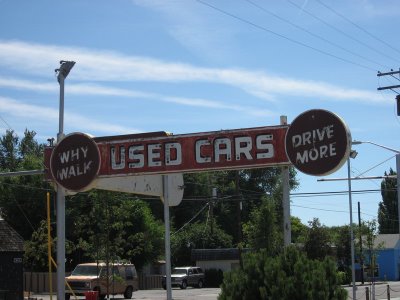
Today’s Oregonian featured a brief editorial about the ongoing sell-off and shut down of our National Forest campgrounds: “The Bush administration has no interest in outdoor recreation. It’s not a priority of Congress, either.”
That’s too bad. For twenty-five years now, I’ve traveled to every corner of Oregon on camping trips alone or to meet friends and family in national and state campgrounds. The best campgrounds are the most remote and least used, but one thing you notice no matter where you camp is that camping is a family activity. There are usually lots of kids and bikes and dogs. If there’s water anywhere close, there are fishing poles and inner tubes.
What’s clear as you look around is that this is how working-class and low-income Americans go on vacation. My wife and I can’t afford trips to Europe, but we spent three weeks this summer camping in the Northwest and had a wonderful time. We’re old enough and well-off enough to afford a modest travel trailer, but most folks in the campgrounds we stayed at were in tents or tent trailers. It’s been this way for generations.
Now, the Bush administration is selling off and closing down many of these campgrounds, trails, and recreation sites. The Forest Service budget is taking dramatic cuts, and we can’t afford to even maintain the National Parks.
But look around next time you’re on the road and you’ll notice the quickly growing number of high-end “Diesel pusher” motorhomes. These rigs cost out at about three-hundred-thousand dollars. Mostly you’ll see them parked in developed private resorts with full hook-ups, where their electronically controlled satellite dishes home in on the best TV reception and the occupants seem never to go outside.
I can’t think of a more visible example of the Bush Administration’s contempt for working-class Americans. It’s just wrong that the wealthy can use their huge tax cuts to buy McMotorhomes while the Forest Service is sent begging for a few bucks to keep its campgrounds open for the rest of us. We’re losing a big part of a national legacy, and it’s going largely unnoticed.
Next spring, when I head out for some of my favorite campgrounds, I expect to find many of them closed, gates shut and locked with a chain. It’s a little thing, really, compared to some of the calamities of the Bush administration, but somehow it’s the one that makes me the most angry.
It never got debated. It didn’t make the nightly news. It’s just quietly happening while we sleep.



